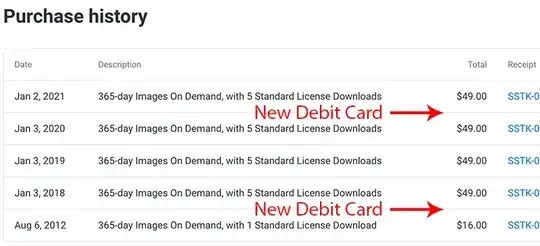I've made a single photo purchase from Shutterstock back in 2012. I created an account and gave them my debit card #. I haven't made a single purchase from them since.
Silently in 2018, they activated auto-renew without my consent, without notifying me via e-mail and without sending a receipt. They just started charging my new debit card. One that I hadn't even given them. This went on for 3 years without me noticing.
Then in July 2020 I lost my wallet, so I requested a new card. Somehow, Shutterstock had my updated debit card number and was able to withdraw from my checking account again in 2021, without me giving them my new debit card info.
I've never given them any of the newer card numbers since 2012. How is it possible for them to always have it? Is my banking information available somewhere for them to look up?
